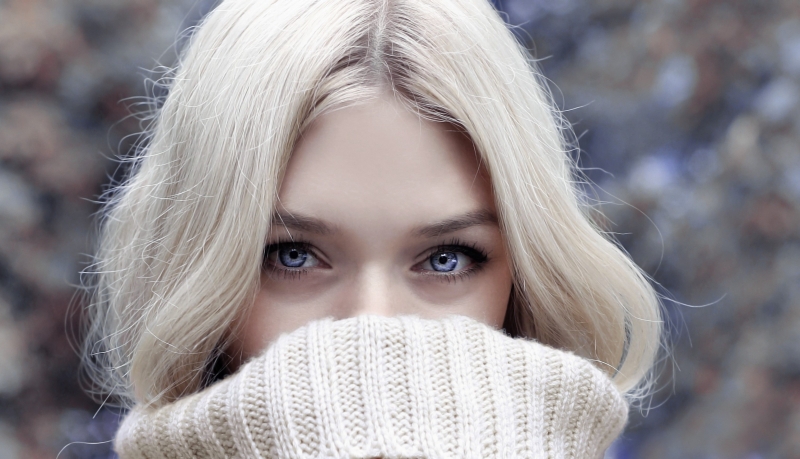In winter, our skin faces special challenges. Therefore, it’s important that we pay attention to proper care.
Why does skin need more care in winter?
The cold air in winter can store less water and is therefore drier, which removes more moisture from the skin when we are outdoors. But even indoors, the humidity drops compared to the summer months due to constant heating.
In addition, some skin functions change in cold weather:
The blood circulation of the skin is reduced at low outdoor temperatures because the body tries to protect itself from heat loss. However, this also means that less oxygen and nutrients reach the skin, making it less resistant.
At temperatures below about 8 degrees Celsius, the sebaceous glands also stop producing. The result for many people is dry, flaky, and itchy skin.
How to keep skin healthy even in winter:
One should adjust skin care and switch to richer products. The light lotions and gel textures of summer now take a break. Facial toners with alcohol also dry out the skin additionally and should be avoided in winter, except for very oily skin.
Instead, use products that provide both sufficient moisture and have a higher fat content. Particularly high-quality plant oils such as Argan oil or Shea butter (Karité) are helpful now and protect our skin in frosty temperatures.
With a treatment using a Skinbooster or with Profhilo®, a unique formulation of high and low molecular hyaluronic acid in particularly high concentration, you can also provide moisture to the skin from within, making it more resistant to dry winter air.
Even if it’s tempting to relax in a hot bath on a cold winter evening, you should definitely not do this daily and the water temperature should not be too high, as this will further deprive the skin of natural oils. If you do indulge in a hot bath (I know, I can’t resist either…), it’s recommended to take an oil bath instead of the usual bubble bath. You can also add a few drops of Lavender oil to the bathwater to enjoy the soothing vapors and relax better after a stressful day.
The same applies to too frequent and too hot showers. Make sure to use mild and moisturizing shower gels or switch to a shower oil altogether (beware of slipping hazards, I unfortunately speak from experience ;-)!)
After showering or bathing, it’s time to moisturize, moisturize, moisturize. Ingredients such as Panthenol and Urea help the skin retain more moisture and reduce unpleasant itching, while almond oil or shea butter have a moisturizing effect.
Vigorous rubbing when drying off is taboo. Instead, gently pat the skin dry to avoid additional stress.
Mechanical peelings that abrade the upper skin layers with small particles are also not a good idea for stressed skin. Instead, chemical peelings, for example with fruit acids, are now suitable. This chemically dissolves the dead skin layers and the pale winter complexion becomes rosy again. Seek advice on this in the practice.
Our hands need special care in winter. A rich hand cream and gloves prevent cracked areas, which can even lead to wounds and infections. Also carefully moisturize the area around the nail bed.
To avoid chapped lips, use a lip balm regularly. The skin on the lips is particularly delicate and sensitive and has no sebaceous glands. Natural oils and beeswax provide especially good protection. It’s best to always have one in your pocket to reapply regularly. Once the lips have become chapped, additional infections can develop that are stubborn.
Under thick wool hats, our hair becomes greasy faster and requires more frequent washing. Here too, it’s important to use mild shampoos to avoid irritating the dry scalp. Otherwise, dandruff and itching are the result.
Although it’s winter and we may see less sun than we’d like, we mustn’t forget about sun protection. Especially when skiing, the sun’s rays are stronger than we expect and are additionally reflected by the snow, so we easily risk sunburn on pale winter skin. Therefore, it’s important to use a suitable sunscreen. Products specifically designed for winter contain additional substances that protect against the icy wind while skiing or on the ski lift. The light products you used in summer are not necessarily suitable. Lip balm should also definitely contain a sun protection factor when skiing.
Delicate children’s skin needs extra protection against the cold. There are appropriate cold protection creams available in pharmacies that protect your little ones against the icy cold, so you don’t have to miss out on fun winter walks or snowball fights.
Last but not least, you should (at any time of the year anyway) pay attention to a healthy diet with sufficient vitamins to provide the skin with everything it needs from within.

Adequate fluid intake is also essential for healthy skin. However, in winter we often have a reduced feeling of thirst. It’s best to put a pot of tea or a carafe of water out and drink it throughout the day.
In our latitudes, many people have a vitamin D deficiency in winter. You can have your vitamin D levels determined in the laboratory through a blood test and supplement if necessary.
The most important thing of all: Even on short, gloomy winter days, don’t forget that even the longest winter eventually ends, and don’t lose your good mood.
